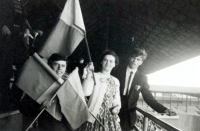
By 1978, ‘larger than life’ soccer managers hadn’t registered with us much, Brian Clough perhaps the wonderful exception. I was aware from football magazines that Malcolm Allison had been a flamboyant chap, but even I wasn’t old enough to have witnessed his pioneering spell as Manchester City manager. At Old Trafford meanwhile, Tommy Docherty was a wise-quipping rogue, a tabloid editor’s gift.
Then the football Gods gifted us the 1978 World Cup. By the end of that chaotic rollercoaster, there would be allegations of bribery and related dark deeds, but to soccer-loving teens in Rooskey – and around the world – all that mattered was the hypnotic football, the addictive drama.
Most games kicked off late at night, Irish-time, and RTE played a blinder. For soccer-obsessed schoolboys who in reality saw very little live coverage during the course of a typical year, these late kick-offs were a magical bonus. We could stay up late at night watching thrilling matches, none more riveting than those involving the host nation, Argentina.
For our generation, this was the first World Cup beamed into our TV screens from South America (too young to remember Mexico 1970). The 1978 World Cup had an air of the exotic about it. When Argentina were in full flow, the atmosphere was like nothing we had ever witnessed before… ticker tape cascading on to the pitch as incredibly passionate home supporters celebrated each Argentinian goal/win. As youngsters, we had no awareness of the political backdrop, the tournament’s legacy later tarnished by allegations of match-fixing, with the strong suspicion that the grubby fingerprints of the Argentine military junta government were imprinted on proceedings. This was a World Cup played in the shadow of dictatorship, not that we knew much about that at the time.
Initial rumours of alleged corruption began to register with us after the Argentina-Peru game. The host country needed to win by four goals or more to advance; they won 6-0, amidst incredible scenes. It was subsequently alleged that Peru had been bribed into ‘throwing’ the game. At the time, we believed we were watching a highly dramatic but legitimate match; however, to this day, the suspicion persists that some degree of corruption was Argentina’s 12th man.
Be that as it may, we revelled in discovering new heroes. Argentina had Passarella, Bertani, Houseman, and Ardiles. Up front, they had the swashbuckling duo, Mario Kempes and Leopoldo Luque. If RTE’s Jimmy Magee enjoyed pronouncing their names, he was positively exuberant when singing the praises of attacking full-back Alberto Tarantini (who somewhat bizarrely joined Birmingham City after the World Cup).
In charge of these men of destiny was César Luis Menotti. We had never seen anyone quite like the Argentinian manager either. Expressive, passionate, charismatic, and quickly labelled “the chain-smoking Menotti”, the manager captivated viewers as he lived every moment of his team’s fate from his restless place in the dugout. Under pressure to somehow deliver an unlikely win for the ages for his people, Menotti led Argentina to victory in that extraordinary World Cup, his team defeating Netherlands 3-1 in the final.
One could say that even before the final whistle had blown, the inquests had begun – but Menotti’s army were gone off into the sunset with the Jules Rimet trophy. César Luis Menotti died last Sunday, aged 85, fondly remembered in Argentina and around the world, if not necessarily aware that once upon a time he was big in Rooskey.






